Are you planning to enter the world of programming? If yes, C is the most basic language you must consider learning. Though you can find various online resources to learn the language, books are irreplaceable. Let us have a look at some of the most classic and timeless C books in this article.
C is a general-purpose programming language designed by Dennis Ritchie in the 1970s. Though it is among the oldest languages, it is still widely used and influential in developing operating systems, device drivers, and protocol stacks. Besides, the language is used to develop embedded systems, compilers, database management systems, and web browsers .
Moreover, C forms the basis for many modern programming languages, such as Java, C++, Python, etc. Though it lacks many features of a modern programming language, such as object-oriented , learning the language is worthwhile, as it helps beginners understand programming concepts, data structures , and algorithms.
In short, C serves as the foundation to put your foot forward in the programming world. Hence, learning this language will help you grasp other programming languages quickly and easily.
While you can find many resources to learn C online, one of the most traditional and effective ways to learn is to opt for books.
In this article, we will explore some of the must-read and timeless C books.
10 Best C Books for Beginners and Advanced Programmers To Master the Language
Let us start our list of the best C books that help individuals grasp the language easily and thoroughly.
1. The C Programming Language (2nd Edition)
Highlights
- Author : Dennis M. Ritchie and Brian W. Kernighan
- Publisher : Pearson
- Paperback Print Length: 272 pages
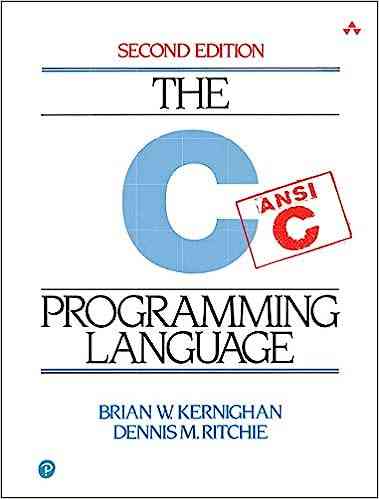
The first edition of the book was published in 1978. It takes you through the basics to the advanced concepts of the C programming language and helps you thoroughly understand every concept. The second edition is completely revised, featuring additional examples and exercises to help you grasp the implementation of complex constructs.
Moreover, it lets readers learn about the finalized ANSI standard for C. It explains to them how to take advantage of C’s data structure, data types, operators, expressions, and control flow. With the detailed coverage of the C reference manual, the second edition walks readers through syntax notations, declarations, ANSI changes, scope rules, etc.
Throughout the second edition, the authors have tried to maintain the brevity of the first edition. Though intended for beginners, the book assumes that readers know basic programming concepts, such as variables, loops, functions, etc. It helps them know how to write C programs . Most examples mentioned in the book are complete and real programs.
You can buy this book from here .
2. Head First C: A Brain-Friendly Child (1st Edition)
Highlights
- Author : Dawn Griffiths and David Griffiths
- Publisher : O’Reilly Media
- Paperback Print Length: 632 pages
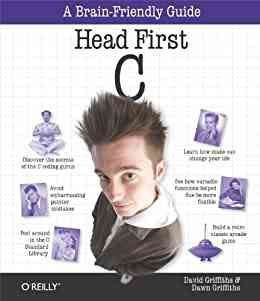
The book is a definitive guide for C and structured imperative programming. Besides teaching the language’s basic syntax and other concepts, the book takes a modern approach to teaching you how to become a good programmer .
Some significant topics covered in this book are language basics, pointers, pointer arithmetic, and dynamic memory management. Multi-threading and network programming are advanced concepts the book covers in the style of college-level C courses. Furthermore, you can find in-depth projects to extend your C capabilities, put your skills to the test, and develop confidence.
The best thing about this book is its rich format of visual designs. Unlike the text-heavy format, it helps your brain absorb information more quickly and does not put you to sleep.
Overall, Head First C is a perfect book for beginners and college-going students.
You can buy this book from here .
3. C Programming Absolute Beginner's Guide (3rd Edition)
Highlights
- Author : Greg Perry & Dean Mille
- Publisher : Que Publishing
- Paperback Print Length: 352 pages
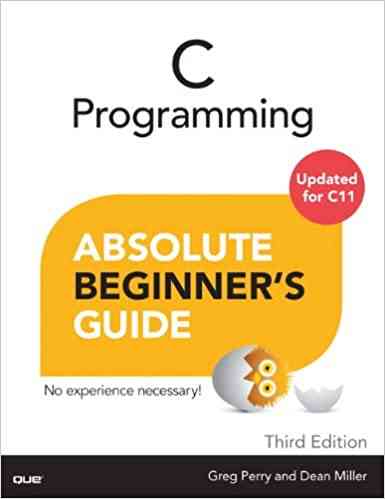
Have you ever wished to write C programs without becoming an expert? If yes, this book is for you. Updated for C11, the book lets you grasp the language basics in the fastest way. You can easily understand organizing programs, storing and displaying data, and working with variables, operators, functions, arrays, pointers, I/O, etc., each one with an easy and concise step at a time.
As the name suggests, the book is the best beginner’s guide, helping you write C programs effectively. Simple instructions help you get started with writing reliable and clean code, helping you develop games and applications in the future. In addition, it equips you with skills you can leverage while learning other programming languages.
You can buy this book from here .
4. Data Structure Through C
Highlights
- Author : Yashavant Kanetkar
- Publisher : BPB Publications
- Paperback Print Length: 647 pages
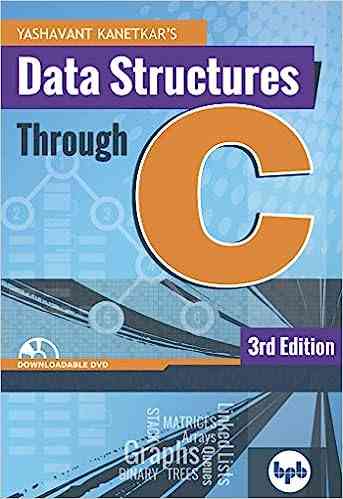
A book by Yashavant Kanetkar focuses on teaching you data structures using the C language. Unlike other data structure books that explain concepts through algorithms, this book does it through complete working programs in C.
The book goes beyond explaining various data structures, such as arrays, strings, sorting, searching, stacks, and trees. Rather than imagining, it lets you practically sort an array, traverse a linked list, and construct a binary tree. High-quality animations depict all these processes for easy grasping.
Besides attractive illustrations, real-world examples depicting the use of data structures and working programs make the book a comprehensive guide. The author has explained every concept in an easy-to-understand language.
This book is ideal for students, computer professionals, programmers, and researchers. It comes with a CD that visually illustrates the theory in the book.
You can buy this book from here .
5. Learn C the Hard Way (1st Edition)
Highlights
- Author : Zed Shaw
- Publisher : Addison-Wesley Professional
- Paperback Print Length: 384 pages
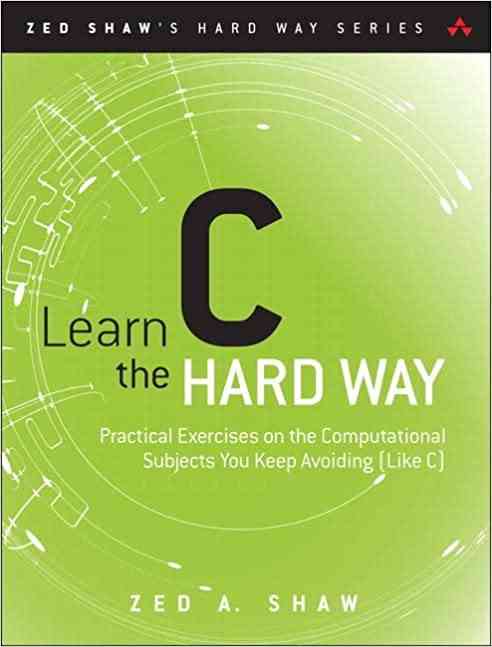
The book is a great compilation of 52 excellently crafted exercises by Zed Shaw. It is accompanied by a DVD containing over 5 hours of video lectures taught passionately by the author. You can refer to it as a complete C video course.
Firstly, watch Zed Shaw’s video lectures and then read the exercises one by one in the book. Implement the code on your system, observe how it runs, and fix issues whenever encountered. Besides, the author explains other skills you need to get started with writing a C program – basic language syntax, compilation, setting up a C environment, debugging , etc.
As you follow the above routine, you will automatically understand what a good C program looks like. You will be able to think more rigorously and effectively about your code and identify and address issues yourself. Above all, you will champion defensive programming techniques with which you can create secure software in any language.
When you start writing code, you put all your theoretical knowledge into practice and start building confidence.
You can buy this book from here .
6. Computer Fundamentals and Programming in C (2nd Edition)
Highlights
- Author: Reema Thareja
- Publisher: Oxford University Press
- Paperback Print Length: 544 pages
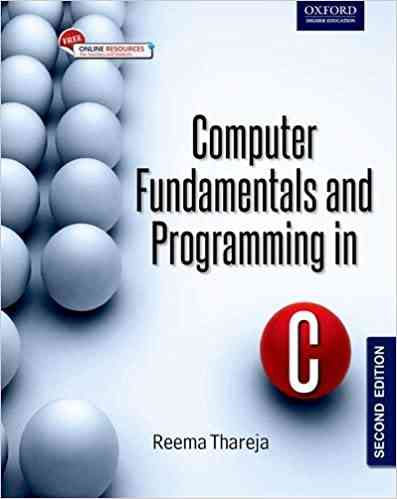
The author has written the second edition of this book for engineering, computer science, and computer applications undergraduate students. It provides thorough knowledge of all fundamental concepts of computer science and C programming.
There are two parts – Computer Fundamentals and Programming in C.
Part 1, Computer Fundamentals, thoroughly introduces computers, various input-output devices, primary and secondary memory devices, and processor architecture.
Part 2, Programming in C, teaches you the basics of C programming and data structures. Also, you will find a number of case studies, well-labeled illustrations, and exercises at the end of each chapter.
Throughout the book, the author has kept the language easy and lucid, allowing beginners to understand concepts. In addition, you will find additional information and programming tips that help you avoid common programming errors.
You can buy this book from here .
7. Low-Level Programming: C, Assembly, and Program Execution on Intel 64 Architecture
Highlights
- Author: Igor Zhirkov
- Publisher: Apress
- Paperback Print Length: 461 pages
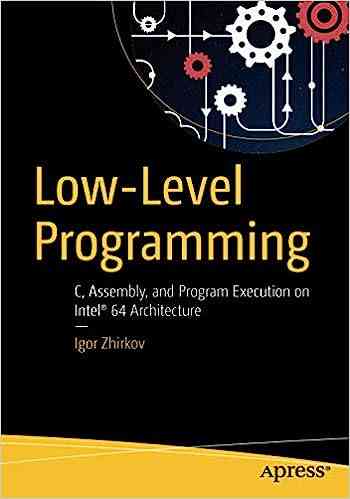
This book walks you through a thorough explanation of the Intel 64 assembly language and the latest version of C, C 11, and assembly language. You will gain a good grasp of the entire process, from writing the source code to compilation and execution, including static and dynamic linking and generating ELF object files.
Moreover, the author has mentioned exercises and code examples for practice. The best coding practices in the book assist you in writing clean and elegant code in C. Learn about the limitations and optimization capabilities of modern compilers. This helps you bring a great balance between program readability and performance.
Moreover, you will explore various performance-gain techniques, such as SSE instructions and pre-fetching. Models of computation and formal grammar with practical uses are depicted in this book. It is ideal for intermediate- and advanced-level C programmers.
You can buy this book from here .
8. C in a Nutshell: The Definitive Reference (2nd Edition)
Highlights
- Author: Tony Crawford and Peter Prinz
- Publisher: O'Reilly
- Paperback Print Length: 824 pages
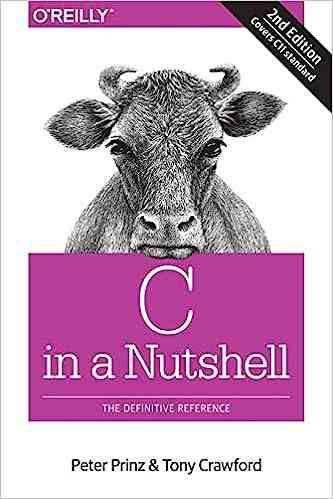
C in a Nutshell is a definitive guide to gaining knowledge of C11. It provides a detailed explanation of each feature of the language, including type-generic macros and multithreading, and the runtime library and its functions. It helps you understand the effects of unfamiliar functions in C and how the standard library requires it to behave with proper examples.
The book is an ideal guide for experienced C and C++ programmers. It also provides an introduction to tools in the GNU software library. Furthermore, the author has explained building C programs with GNU Make, compiling executable programs from the C source code, and using the GNU debugger to test and debug programs.
You can buy this book from here .
9. Hands-On Network Programming with C
Highlights
- Author: Lewis Van Winkle
- Publisher: Packt Publishing Limited
- Paperback Print Length: 478 pages
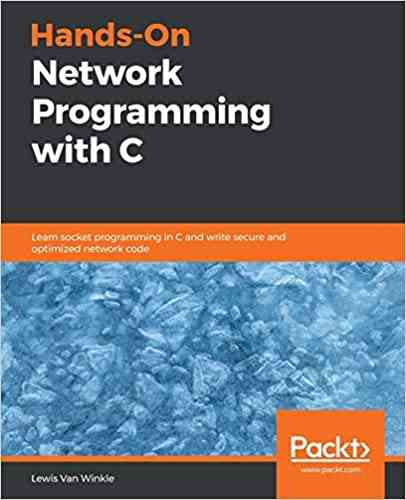
Are you a developer or system willing to learn network programming? This is a perfect handbook. It is a guide to programming with network sockets, designing IoT devices, and implementing internet protocols.
This C networking programming book begins with the basics of the Internet Protocol and TCP and UDP . Further, it moves on to explaining client-to-server and peer-to-peer models for information sharing and connectivity. You will also explore HTTP and HTTPS to understand the communication between web browsers and websites.
As you move further, the book explains hostname resolution with DNS, asynchronous socket programming and streams, and debugging and error handling. Finally, it provides insights into network monitoring and the implementation of the best security practices.
After you complete reading this book, you will have hands-on experience working with client-server applications. You will be equipped to work with new network programs in C.
Note: All source codes mentioned in this book are compatible with C99 versions and the latest C18 and C++17 standards.
You can buy this book from here .
10. Data Structures Using C (2nd Edition)
Highlights
- Author: Reema Thareja
- Publisher: Oxford
- Paperback Print Length: 560 pages
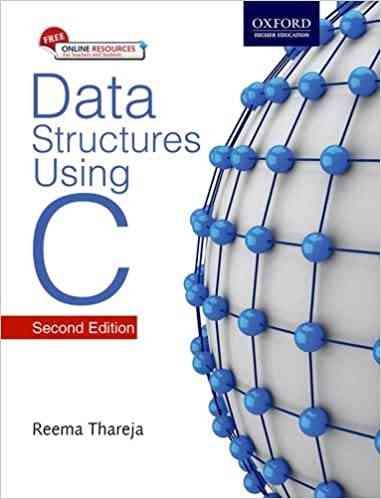
Data Structures Using C is a comprehensive guide providing in-depth coverage of data structures’ abstract concepts and their implementation in the C language. This book starts with introducing the basic C concepts and moves forward to the fundamentals of data structures and methods to determine the complexity of different algorithms.
Arrays, linked lists, stacks, queues, strings, heaps, and graphs are data structures covered in this book. The book takes a systematic approach where the explanation of each data structure is followed by different operations performed on them with their algorithms and the run-time analysis of these algorithms.
Moreover, at the end of every chapter, the author provided multiple MCQs and answers, review questions, and programming exercises.
You can buy this book from here .
Conclusion
C is not a new language, albeit a very old programming language. In fact, it has been the inspiration and foundation for so many popular programming languages. Learning C only to gain a good job is not a good idea. However, learning the language to understand programming concepts better is a very good idea. Moreover, it becomes easier to grasp other programming languages after learning C.
With the above compilation of the best C books, you can undoubtedly learn and master the language. If you want us to add any other books to the above list, let us know in the comments.
People are also reading:
![10 Best C Books For Beginners and Advanced Programmers [Top-Ranked]](/media/new_post_images/C-Books.webp)




Leave a Comment on this Post